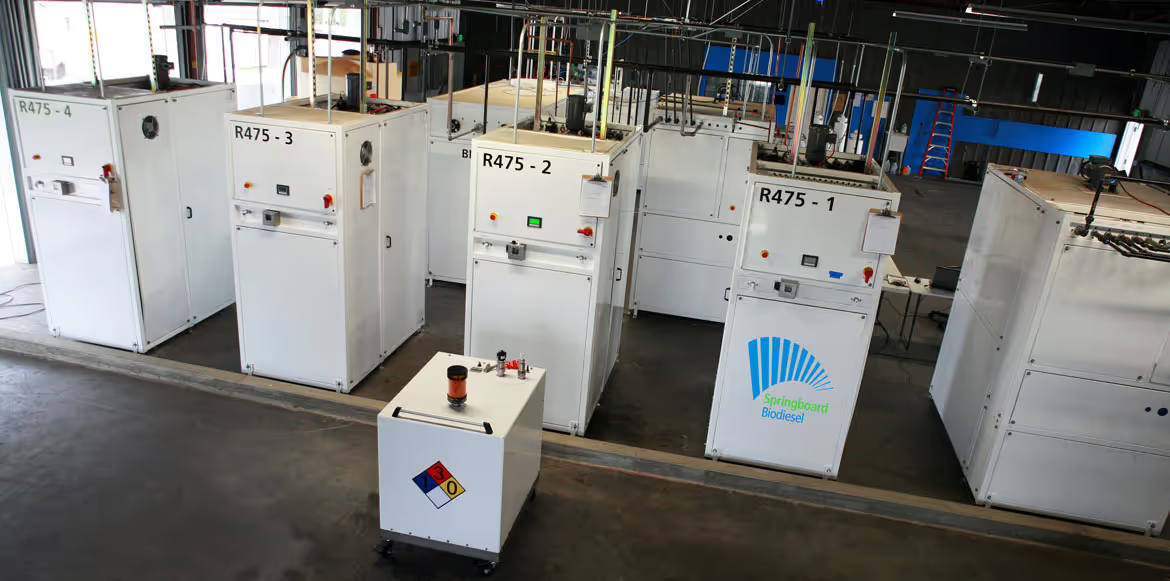What is Biodiesel?
Biodiesel is an exciting and very fast growing alternative fuel that can be purchased or made yourself. There are two ways we might answer the question, "What is biodiesel?"
From a technical standpoint:
Biodiesel is a diesel cycle fuel manufactured from vegetable oils, recycled grease, and/or animal fats. The general chemical designation for biodiesel is ‘Fatty Acid Alkyl Esters.’ Biodiesel and biodiesel blends can be used in CI engines. In diesel-powered cars, trucks, tractors, boats, shipping equipment, irrigation systems, mining equipment, electrical generators, and most applications where diesel is typically used. See Biodiesel Basics, (Alternative Fuels Data Center) and also Biofuels Explained (U.S. Energy Information Administration)
From a practical standpoint:
Biodiesel works in all diesel engines. It's made from natural oils rather than petroleum. Biodiesel performs similarly to diesel fuel, and can be used with no modifications to the diesel engine or the vehicle.
Bio Basics
To get a better understanding of what biodiesel is, here are a few basic terms associated with biodiesel.
Titration
Titration is a common laboratory method of quantitative/chemical analysis that can be used to determine the concentration of a known reactant. Titration is an indirect test for free fatty acids (FFA) in waste vegetable oil. With typical restaurant waste oil (less than 5% FFA), there's no need to perform titration with the BioPro™. [Titration, Wikipedia]
Free Fatty Acid (FFA)
Fatty acids can be bound or attached to other molecules, such as triglycerides or phospholipids. When they're not attached to other molecules, they're known as free fatty acids. Typically FFA are detrimental to the biodiesel making process. For most other reactors, if the FFA level in an oil exceeds 2% to 3%, then it is nearly impossible to convert into biodiesel. In the BioPro™ 190, the maximum recommended level is 5%. [Free fatty acid, Wikipedia]
Waste Vegetable Oil
Many vegetable oils have similar fuel properties to diesel fuel, except for higher viscosity and lower oxidative stability. If these differences can be overcome, vegetable oil may substitute for #2 Diesel fuel, most significantly as engine fuel or home heating oil. [Vegetable oil fuel, Wikipedia]
Emulsions
Makers of biodiesel occasionally encounter emulsions when they are washing their fuel with water. Due to emulsifying contaminants in raw fuel as well as cold weather and other factors, the water can form a dispersed phase in the continuous biodiesel phase. An emulsion is a mixture of two immiscible (unblendable) liquids. One liquid (the dispersed phase) is dispersed in the other (the continuous phase). Many emulsions are oil/water emulsions, with dietary fats being one common type of oil encountered in everyday life. Examples of emulsions include butter and margarine, milk and cream, and vinaigrette; the photo-sensitive side of photographic film, magmas and cutting fluid for metal working. [Emulsion, Wikipedia}]
Additional Resources
- Biodiesel basics [U.S. Department of Energy]
- Biodiesel: A renewable domestic energy resource [Penn State Extension]
- Just the basics: biodiesel [U.S. Department of Energy • Office of Energy Efficiency and Renewable Energy]
- Biodiesel – mono alkyl esters [DieselNet Technology Guide]
- Fatty acid alkyl esters: perspectives for production of alternative biofuels [Applied Microbiology and Biotechnology]
- Biodiesel [Clean Air Choice]
- Clean Fuels Alliance America [formerly National Biodiesel Board]
- Biodiesel vs. diesel: everything you need to know [Car and Driver]













.svg)
